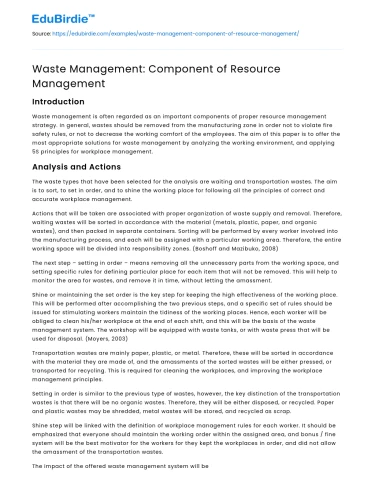Introduction
Waste management is often regarded as an important components of proper resource management strategy. In general, wastes should be removed from the manufacturing zone in order not to violate fire safety rules, or not to decrease the working comfort of the employees. The aim of this paper is to offer the most appropriate solutions for waste management by analyzing the working environment, and applying 5S principles for workplace management.
Analysis and Actions
The waste types that have been selected for the analysis are waiting and transportation wastes. The aim is to sort, to set in order, and to shine the working place for following all the principles of correct and accurate workplace management.
Save your time!
We can take care of your essay
- Proper editing and formatting
- Free revision, title page, and bibliography
- Flexible prices and money-back guarantee
Actions that will be taken are associated with proper organization of waste supply and removal. Therefore, waiting wastes will be sorted in accordance with the material (metals, plastic, paper, and organic wastes), and then packed in separate containers. Sorting will be performed by every worker involved into the manufacturing process, and each will be assigned with a particular working area. Therefore, the entire working space will be divided into responsibility zones. (Boshoff and Mazibuko, 2008)
The next step – setting in order – means removing all the unnecessary parts from the working space, and setting specific rules for defining particular place for each item that will not be removed. This will help to monitor the area for wastes, and remove it in time, without letting the amassment.
Shine or maintaining the set order is the key step for keeping the high effectiveness of the working place. This will be performed after accomplishing the two previous steps, and a specific set of rules should be issued for stimulating workers maintain the tidiness of the working places. Hence, each worker will be obliged to clean his/her workplace at the end of each shift, and this will be the basis of the waste management system. The workshop will be equipped with waste tanks, or with waste press that will be used for disposal. (Moyers, 2003)
Transportation wastes are mainly paper, plastic, or metal. Therefore, these will be sorted in accordance with the material they are made of, and the amassments of the sorted wastes will be either pressed, or transported for recycling. This is required for cleaning the workplaces, and improving the workplace management principles.
Setting in order is similar to the previous type of wastes, however, the key distinction of the transportation wastes is that there will be no organic wastes. Therefore, they will be either disposed, or recycled. Paper and plastic wastes may be shredded, metal wastes will be stored, and recycled as scrap.
Shine step will be linked with the definition of workplace management rules for each worker. It should be emphasized that everyone should maintain the working order within the assigned area, and bonus / fine system will be the best motivator for the workers for they kept the workplaces in order, and did not allow the amassment of the transportation wastes.
The impact of the offered waste management system will be linked with the opportunity to maintain the high effectiveness of the workplaces, and follow the fire safety rules, as the emergency exits, as well as the free space will not be blocked up. Additionally, this will improve the supply chain management of the company, as wastes will be disposed or recycled in time.
Conclusion
Waste management for the factory regarded in this case should be performed from the perspective of the highest efficiency possible, and implementation of the responsibility standards for each worker. Hence, the problem of wastes of any kind will be resolved easily.






 Stuck on your essay?
Stuck on your essay?

